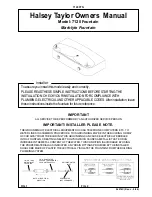
Germicidal UV-C Light Notice.
Never directly look at the UV-C light while the unit is
illuminated-doing so could result in temporarily or chronic
damage to your eyesight or may even lead to loss of vision.
UV light is harmful to exposed skin and eyes.
To prevent exposure to UV light, always disconnect the
power to the unit once the disinfection process is finished.
Do not use the unit if any part of the lamp is damaged or
cracked.
Apollo Disposal
UV lamps as with fluorescent light bulbs contain mercury
and must be disposed of properly. Therefore do not throw
out old lamps into the trash.
Most communities have agencies that accept mercury along
with other carcinogenic materials like old paint and solvent
that requires special disposal.
Contact your municipal or county waste collection agency
please for proper disposal procedure and guidance.
If a lamp is broken do not use a vacuum cleaner to pick up
the waste. Rather, sweep up the waste contents into a plastic
bag and seal.
Please contact your municipal or county waste collection
agency for proper disposal procedures.
Facility Safety Awareness
Maintenance and janitorial personnel may be accidentally
exposed to the radiation of UV lamps while in the course of their
duties, it is essential that all UV sources and facilities be
adequately labeled to instruct personnel of the dangers of
exposure.
Ideally, all activated UV sources should either be attended by
knowledgeable personnel at all times, or the lamps should be
housed in foolproof, interlocked enclosures.
However, warning signs are needed in both cases. Prominent
activation warning lights are also helpful.
Personal Protective Equipment
Personal protective equipment must be worn by
individuals exposing themselves to an operating UV
lamp. The personal protective equipment must protect
the eyes and skin. Appropriate PPE would include
gloves, lab coat with no gap between the cuff and the
glove, and a UV resistant face shield.
Access to room
Access to the room must be strictly controlled while the
lamps are operating to prevent employee exposure. The
UV lamp should only be operational when the door is
closed. It is recommended that the UV lamp should be
used when employees are off site.
Signage
Posting a warning sign on the door when the lamp is
operating is highly recommended. Most UV exposure
accidents involve a party that was not aware of UV-C use in
the room. The warning sign should include Caution: High
Intensity Ultraviolet Energy. Protect Skin and Eyes.
Maintenance/Monitoring
Unplug the unit before bulb replacement and cleaning.
Bulbs should be wiped off on a quarterly basis with a soft
cloth and dampened with ethanol. The bulb must not be
operating and must be cool to the touch prior to wiping. A
Bulbs life span is 9000 hours of use
Suggested Disinfection Times
Disinfection times depend upon size of the room
which requires disinfection. Please refer to table
below as a guideline.
Room Area (ft
2
)
!
Recommended Disinfection
Time
160 ft
2
15 minutes
320 ft
2
30 minutes
480 ft
2
45 minutes
645 ft
2
60 minutes
Exposure time should be increased if:
1. Room temperature is below 68 degrees Fahrenheit
2. Room temperature is above 104 degrees Fahren-
heit
3. Unit is operated in germ prone environment
4. Unit is operated in wet areas of your home (e.g.
bathroom)
Analysis and Test Results for Apollo on
pathogenic microbial strains.
Duration: 30min
Distance: 30cm
Test organism
Test
Group
Average
cfu of
testing
groups
(cfu piece)
Average
cfu of
positive
controls
(cfu piece)
Sterilization
logarithm
(KL)
Sterilization
Rate (%)
Escherichia coli
8099
1
<5
1.6x10^6
>5.51
>99.9
2
<5
1.7x10^6
>5.51
>99.9
3
<5
1.6x10^6
>5.51
>99.9
average
1.6x10^6
>5.51
>99.9
Staphylococcus
aurous ATCC
6538
1
<5
3.4x10^6
>5.83
>99.9
2
<5
3.2x10^6
>5.83
>99.9
3
<5
3.6x10^6
>5.83
>99.9
average
3.4x10^6
>5.83
>99.9
Candida albicans
ATCC
10231
1
10
8.0x10^6
4.89
99.99
2
5
8.0x10^5
5.19
99.99
3
10
7.5x10^5
4.89
99.99
average
7.8x10^5
4.99
99.99






















